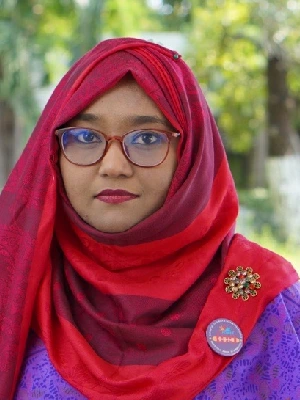Faria Pushpo is passionate about women's education, and always hungry to learn more. An engineer with Bangladesh's West Zone Power Distribution Company, her academic accolades are already impressive: undergraduate and graduate degrees in mechanical engineering from Khulna University of Engineering and Technology, an MBA from Bangladesh Open University, and a current PhD candidate position at Khulna. And now, to top it all off, Faria adds a SAR100 professional training certificate to her growing list of achievements.
"The journey of this training is now a good memory for me," explains Faria. "It's enhanced my confidence and leadership capabilities, and my vision for sustainable energy."
In a nutshell, the training Faria refers to is the WePOWER SAR100 training program, delivered by the Asian Institute of Technology (AIT). Over 8 months from 2023 - 2024, 101 talented female engineers – Faria included - from Bangladesh, Bhutan, India, Maldives, Nepal, Pakistan and Sri Lanka, participated in a series of online modules and research projects, collaborating on some of the South Asian region's most pressing energy issues. The course was made possible through the AU $32 million South Asia Regional Infrastructure Connectivity (SARIC) Program, which is funded by the Australian Government and implemented by Palladium alongside the World Bank and the International Finance Corporation.
When SAR100 wrapped in March, many of the women met in Bangkok for a busy final capstone week, Faria amongst them.
"SAR100 created a wonderful platform for me to meet so many talented people and experts. This global network has enabled me to learn so many things, besides just the technical lessons," said Faria. "I hope to serve with the knowledge I've gained."
According to Faria, SAR100 was particularly helpful in taking her engineering software skills to the next level.
"I got to learn new technologies in the energy sector, useful for sustainable energy transition. I learnt how to use Matlab, PSSE, which is a very important tool. Now I feel confident to solve problems using these software applications – I believe this training will be very helpful for my professional growth."
Faria's final SAR100 research project, which incorporated her new software skills, provided a valuable opportunity to explore renewable energy ventures across South Asia. Her group project, titled ‘Renewable Energy Ventures: Exploring Financing Strategies, Investment Approaches, and Tariff Determination Procedures through Case Studies', saw her graduating with more knowledge and skills than ever before.
"Before taking the SAR100 course, my skill gaps were in cross-border interconnection for renewable energy and regulatory frameworks for South Asian countries. The concept of regional energy interconnection is quite clear now."
As she returns home to Bangladesh, a country that is looking at how it should best invest in renewable and clean energy, Faria's new software skills will no doubt be put to good use.
Combined with her SAR100 networks and connections, anything is possible.

